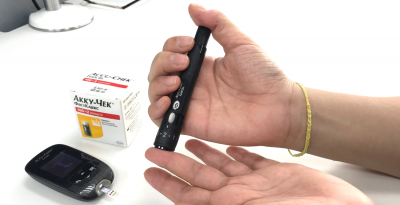Your Eyes Are Two Good Reasons To Take Care Of Your Diabetes
Managing diabetes can be complex, but it should not mean missing out on the good things in life, like watching a sunset or reading a book. Keeping blood glucose levels within range can help prevent complications such as those that affect your eyes. Over time, diabetes may cause damage to the eyes which can lead to poor vision or even blindness. Diabetic retinopathy is the most common complication of diabetes and affects one third of people living with diabetes.1 RISK FACTOR Beyond poorly managed diabetes, smoking, high blood...
Read MoreIntroduction to Self-Monitoring of Blood Glucose (SMBG)
SMBG is a blood glucose (blood sugar) monitoring procedure performed by people with diabetes on themselves or by their care taker. Taking SMBG another step further, your doctor may have recommended you to perform such monitoring in a Structured Testing way. Structured Testing. Structured testing means checking your blood glucose at a specific time of the day or before or after an event (such as exercise, food, etc.) over a period of time. There are different ways to perform structured testing,...
Read MoreHbA1c Test Goals
An HbA1c result tells you your average level of blood glucose (blood sugar) over the past 2 to 3 months. It measures the percentage of hemoglobin A1c in the red blood cells which have glucose attached to them. However, it is important to note that HbA1c will not provide you any information about high or low results nor help you with identifying any day to day patterns. It has been noted that some people with diabetes falsify their blood glucose results in their diary in order to keep their healthcare professional “happy” but HbA1c will easily uncover the true situation. What Is Hemoglobin...
Read MoreWhen To Test Your Blood Glucose?
Your doctor would have advised you on when to test your blood glucose (blood sugar). In addition, below is the recommended frequency of blood glucose testing by Malaysia’s Ministry of Health (MOH)1. Mode of Treatment Breakfast Lunch...
Read MoreBe On Target
Every person with diabetes should be treated according to their individual needs, hence you and your doctor will agree on an acceptable blood glucose (blood sugar) target range that will suit your therapy needs. If you do not know what is a target range for you, there are general guidelines for people with diabetes you can refer to. Below are the blood glucose target ranges recommended by our Malaysia’s Ministry of Health (MOH): ...
Read MoreProtect Your Heart, Control Your Blood Glucose Level
Persistent high blood glucose (blood sugar) levels can lead to diabetes related complications such as kidney disease, eye disease, numbness and weakness of hands and legs, but heart diseases have topped it all1. Action to be taken. The Ministry of Health (MOH) Malaysia recommends keeping control of your blood glucose...
Read MoreLearning From Your Blood Glucose Results
It's likely that your healthcare team has talked to you about the importance of checking your blood glucose (blood sugar). But many people don't realize just how much valuable information they can obtain from their blood glucose results. Blood glucose monitoring shows how your body handles the food you eat, how exercise affects those glucose levels and how the medication you are taking is working—as well as letting you know if your body has the fuel it needs throughout the day. Such information is essential to anyone who self-manages their diabetes. It's important to know that keeping...
Read MoreReducing Pain Experience
When checking your blood glucose (blood sugar), always choose a lancing device with technology that reduces vibration - so there’s less skin tearing during finger pricking, hence reducing pain. The Accu-Chek FastClix and Accu-Chek Softclix lancing device is utilizing Clixmotion® technology. This patented technology makes finger pricking especially gentle for you and helps to minimize skin and nerve ending damage1...
Read MoreHow To Test Your Blood Glucose?
To check your blood glucose level, gather your blood glucose meter, a test strip and your lancing device. Watch the video below on how to test your blood glucose using the Accu-Chek Guide system. For specific Accu-Chek meter instructions on how to test your blood glucose levels, visit the ...
Read MorePages
Introduction to Self-Monitoring of Blood Glucose (SMBG)
SMBG is a blood glucose (blood sugar) monitoring procedure performed by people with diabetes on themselves or by their care taker. Taking SMBG another step further, your doctor may have recommended you to perform such monitoring in a Structured Testing way. Structured Testing. Structured testing means checking your blood glucose at a specific time of the day or before or after an event (such as exercise, food, etc.) over a period of time. There are different ways to perform structured testing,...
Read MoreHbA1c Test Goals
An HbA1c result tells you your average level of blood glucose (blood sugar) over the past 2 to 3 months. It measures the percentage of hemoglobin A1c in the red blood cells which have glucose attached to them. However, it is important to note that HbA1c will not provide you any information about high or low results nor help you with identifying any day to day patterns. It has been noted that some people with diabetes falsify their blood glucose results in their diary in order to keep their healthcare professional “happy” but HbA1c will easily uncover the true situation. What Is Hemoglobin...
Read MoreWhen To Test Your Blood Glucose?
Your doctor would have advised you on when to test your blood glucose (blood sugar). In addition, below is the recommended frequency of blood glucose testing by Malaysia’s Ministry of Health (MOH)1. Mode of Treatment Breakfast Lunch...
Read MoreBe On Target
Every person with diabetes should be treated according to their individual needs, hence you and your doctor will agree on an acceptable blood glucose (blood sugar) target range that will suit your therapy needs. If you do not know what is a target range for you, there are general guidelines for people with diabetes you can refer to. Below are the blood glucose target ranges recommended by our Malaysia’s Ministry of Health (MOH): ...
Read MoreProtect Your Heart, Control Your Blood Glucose Level
Persistent high blood glucose (blood sugar) levels can lead to diabetes related complications such as kidney disease, eye disease, numbness and weakness of hands and legs, but heart diseases have topped it all1. Action to be taken. The Ministry of Health (MOH) Malaysia recommends keeping control of your blood glucose...
Read MoreLearning From Your Blood Glucose Results
It's likely that your healthcare team has talked to you about the importance of checking your blood glucose (blood sugar). But many people don't realize just how much valuable information they can obtain from their blood glucose results. Blood glucose monitoring shows how your body handles the food you eat, how exercise affects those glucose levels and how the medication you are taking is working—as well as letting you know if your body has the fuel it needs throughout the day. Such information is essential to anyone who self-manages their diabetes. It's important to know that keeping...
Read MoreReducing Pain Experience
When checking your blood glucose (blood sugar), always choose a lancing device with technology that reduces vibration - so there’s less skin tearing during finger pricking, hence reducing pain. The Accu-Chek FastClix and Accu-Chek Softclix lancing device is utilizing Clixmotion® technology. This patented technology makes finger pricking especially gentle for you and helps to minimize skin and nerve ending damage1...
Read MoreHow To Test Your Blood Glucose?
To check your blood glucose level, gather your blood glucose meter, a test strip and your lancing device. Watch the video below on how to test your blood glucose using the Accu-Chek Guide system. For specific Accu-Chek meter instructions on how to test your blood glucose levels, visit the ...
Read More








